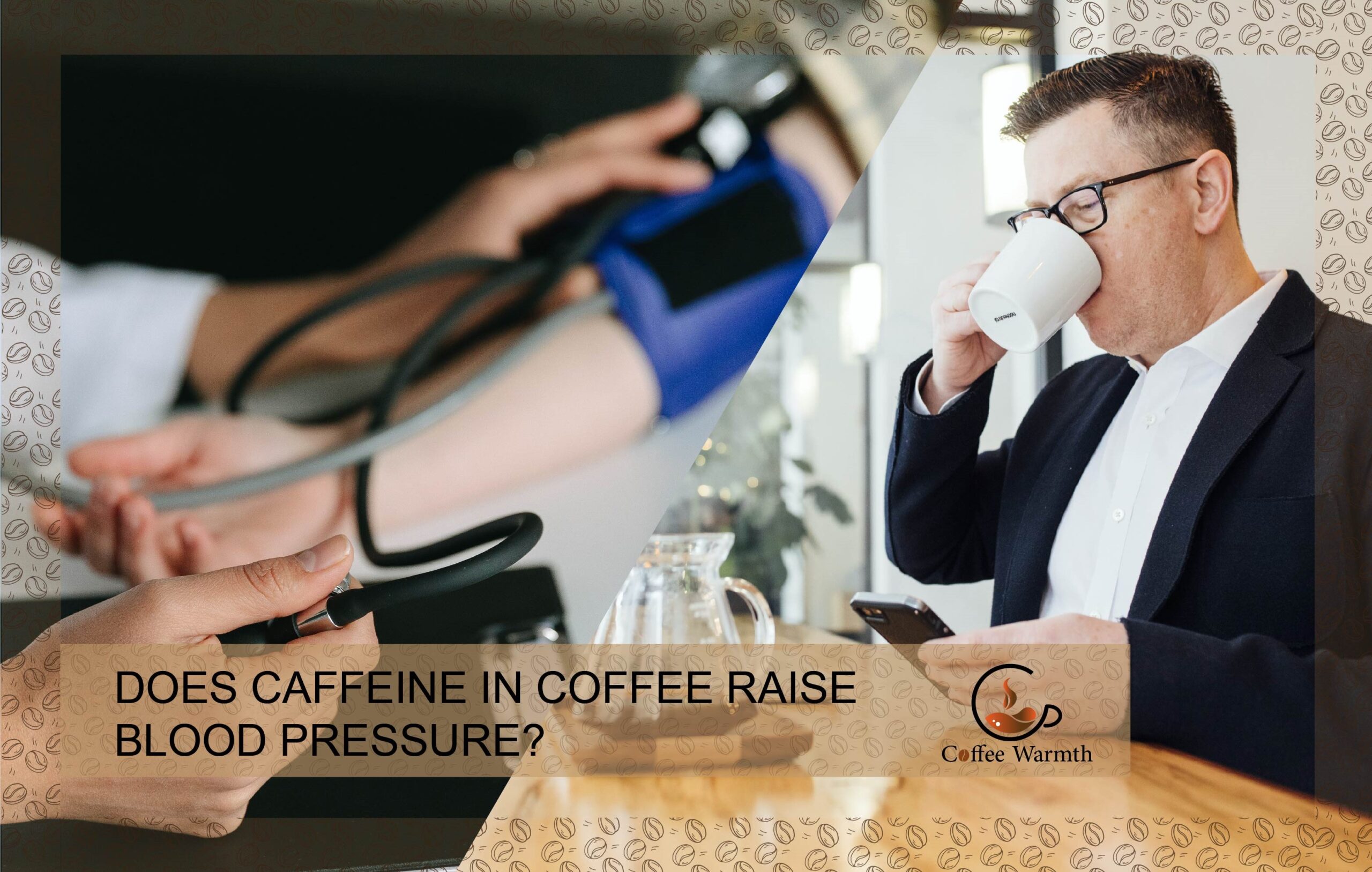Yes, caffeine in coffee raises blood pressure temporarily but it may even lower blood pressure in some long-term coffee consumers. High blood pressure or hypertension, as defined by the American Heart Association, is a consistently high force of blood flowing through your blood vessels.
Hypertensive individuals should not drink coffee to avoid temporary spikes in blood pressure as it can lead to symptoms like anxiety, palpitations, and sleep disruption. However, this temporary blood pressure rise cannot increase heart rate or cause heart attack.
Coffee drinks with excessive amounts of caffeine like espresso have a higher risk of raising blood pressure acutely than coffee drinks with low caffeine like decaf coffee. A standard 8 fl.oz. cup of black coffee has a moderate risk of increasing blood pressure.
Some studies conclude that drinking coffee for long periods may decrease blood pressure in hypertensive individuals. Nevertheless, the American Heart Association suggests restricting coffee consumption to 1 cup (8 fl. oz.) per day for high-risk hypertensive individuals.
How Does Caffeine in Coffee Raise Blood Pressure?
Caffeine in coffee raises blood pressure temporarily by inhibiting adenosine receptors. Adenosine receptor inhibition leads to vasoconstriction of various vessels in the body. The acute vasoconstriction causes a temporary rise in blood pressure levels.
Caffeine in coffee also activates the excitatory neurotransmitters like norepinephrine, dopamine, acetylcholine, and glutamate. Caffeine increases the functioning of the adrenal cortex, sympathetic nervous system, and renin–angiotensin system. All these factors raise blood pressure acutely after coffee consumption according to Jane R Mort and Heather R Kruse from South Dakota State University.
The activation of the sympathetic nervous system and adrenal cortex releases catecholamines and stress hormones respectively. A rise in plasma catecholamines and stress hormone levels causes vasoconstriction leading to rise in blood pressure.
Drinking 2-3 cups of coffee can raise blood pressure by inhibiting phosphodiesterase. Phosphodiesterase inhibition causes vasoconstriction as concluded by Joseph L. Izzo Jr, MD, from State University of New York at Buffalo.
Coffee may raise blood pressure by promoting hyperlipidemia through lipid compounds cafestol and kahweol found in coffee as concluded in a study by Professor Urgent from Wageningen Agricultural University.
The diagram below summarizes the results of abovementioned studies and how caffeine in coffee raises blood pressure.
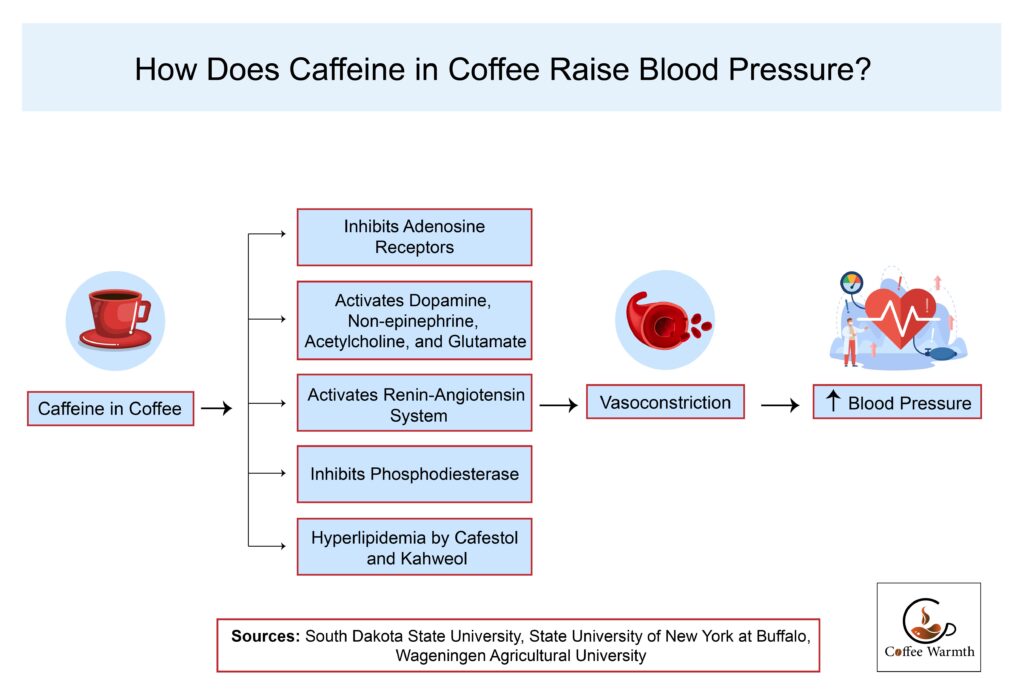
Drinking coffee raises blood pressure prominently in those who don’t consume coffee regularly. A study published in the Journal of Clinical Investigation states that a single cup of coffee causes the greatest blood pressure response in those with lowest plasma caffeine concentration. Habitual coffee drinkers have no relationship with high blood pressure according to a study published in the European Journal of Clinical Nutrition.
Should You Avoid Coffee If You Have High Blood Pressure?
Yes, you should avoid coffee if you have high blood pressure. Coffee acutely raises blood pressure which can further elevate blood pressure in hypertensive people. A study in the American Journal of Hypertension concludes that caffeine consumption increases systolic blood pressure and pulse pressure in treated hypertensive patients.
However, you don’t need to quit coffee all together. Limiting your daily intake to 1 cup of coffee will keep your blood pressure in control as per American Heart Association.
There is some evidence which shows that long-term coffee consumption might not have any effect on blood pressure in hypertensive individuals. A study published in The American Journal of Medicine states that regular caffeine intake is not associated with increased blood pressure in hypertensive patients. A.V Mattioli from Department of Life Science, University of Modena and Reggio Emilia concludes in his study that coffee consumption was less likely to cause problems with heart rhythm in hypertensive patients.
Does Coffee Raise Blood Pressure Temporarily or Permanently?
Coffee raises blood pressure temporarily in normal and hypertensive individuals. Blood pressure rises within 30 minutes of coffee consumption, reaches its peak in 1-2 hours, and lasts for more than 3 hours, according to a study of Jane R Mort in the Annals of Pharmacotherapy in 2008.
According to a study published in the American Journal of Nutrition, the increase in blood pressure after coffee intake is observed in the first hour and this increase lasts for more than 3 hours.
However, regular coffee consumption doesn’t elevate blood pressure both temporarily and permanently in normal individuals. according to a study published in the European Journal of Clinical Nutrition.
The blood pressure response to coffee differs among individuals due to the broad half life of caffeine (2 to 10 hours). So, you should be mindful of your caffeine intake if you have high blood pressure.
What Are the Symptoms of Coffee Induced Hypertension?
The symptoms of coffee induced hypertension are anxiety, palpitations, and trouble sleeping according to the American Heart Association.
These coffee induced hypertension symptoms are listed in the image below.
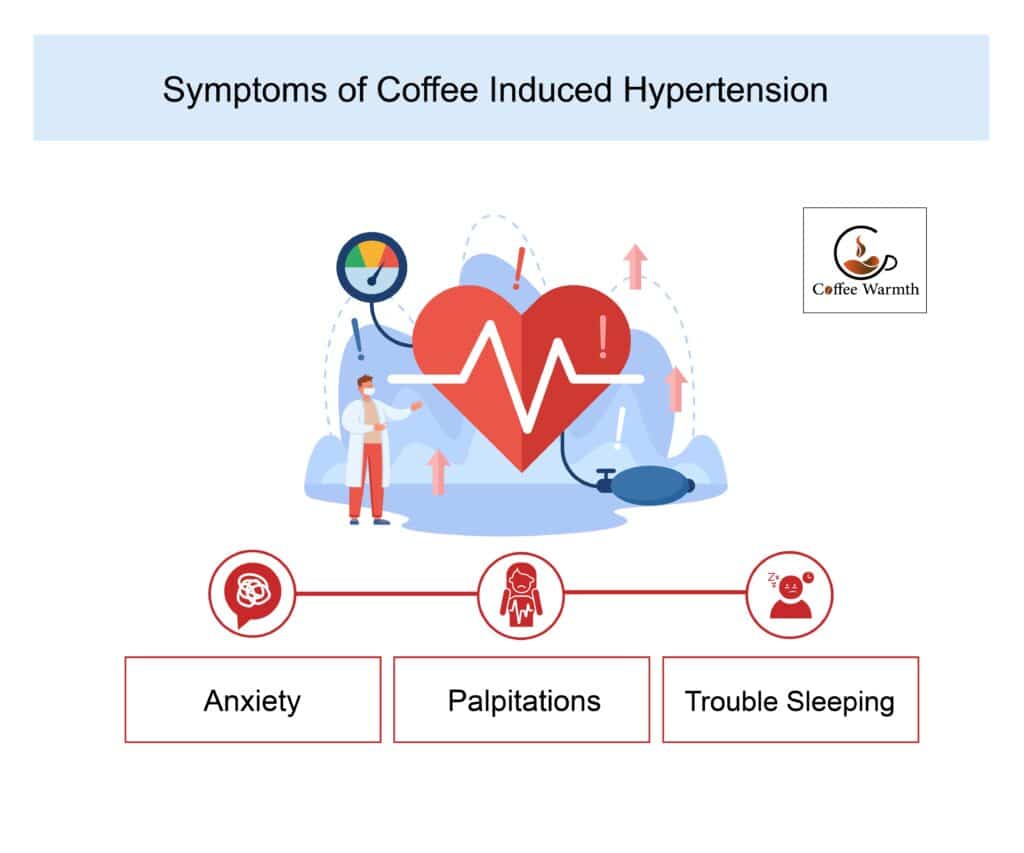
Studies published in the International Journal of General Medicine, BioMed Research International, Current Problems in Cardiology, Open Journal of Preventive Medicine, Sleep, and Sleep Medicine Reviews provide the relevant evidence.
Anxiety
A study published in 2023 in the International Journal of General Medicine shows that medical students have a direct relationship between drinking coffee, high blood pressure, and anxiety during exams. Another study published in 2022 in the BioMed Research International shows that hypertensive patients had higher coffee intake and higher depression scores.
Palpitations
Coffee consumers often experience palpitations accompanied with a temporary rise in blood pressure, according to a study published in the Journal ‘Current Problems in Cardiology’. A recent study in 2023 in the Open Journal of Preventive Medicine concludes that caffeine consumption adversely causes hypertension and palpitations in the general population.
Trouble sleeping
Caffeine in coffee promotes wakefulness by blocking adenosine receptors as mentioned in the Journal ‘Sleep Medicine Reviews’. A study published in the Journal ‘Sleep’ studied the association of sleep and hypertension with caffeine and alcohol consumption and smoking in 5910 participants from age 40-100. The results concluded that hypertensive individuals consuming coffee had trouble sleeping with a sleep cycle of 6 hours or less.
Does Caffeine in Coffee Raise Heart Rate?
Caffeine in coffee may or may not increase heart rate depending on the individual’s physiological responses to caffeine.
According to a study published in the Journal of Behavioral Medicine, 125 mg caffeine consumption elevated heart rate overnight in normotensive individuals. Drinking caffeinated coffee yields a higher heart rate in normal individuals compared to those who consume decaffeinated coffee, as found in the Journal of Undergraduate Research of University of Wisconsin-La Crosse.
However, there are contradicting studies that show a decrease in heart rate after drinking coffee. A study “Cardiovascular effects of coffee and caffeine” published in the American Journal of Cardiology found a decrease of 10 beats/minutes after coffee consumption. Mikalsen et al says that this decrease in heart rate is due to variable physiological factors of each individual.
Can Caffeine in Coffee Cause Heart Attack?
No, caffeine in coffee cannot cause a heart attack. Drinking coffee raises blood pressure temporarily but doesn’t increase the risk of heart attack according to researchers from Harvard and Dundee University.
Harvard researchers followed 45,589 men between ages 40-75 years to see the link between drinking coffee and risk of coronary artery disease leading to heart attack. The results showed that even heavy coffee drinkers were not at risk of heart attack due to coffee consumption.
The famous Scottish Heart Health Study done by Dundee scholars followed 10,359 men and women aged 40-59. They found a protective effect of coffee on the heart in heavy drinkers.
The image below illustrates the results of the study conducted by Harvard and Dundee University.
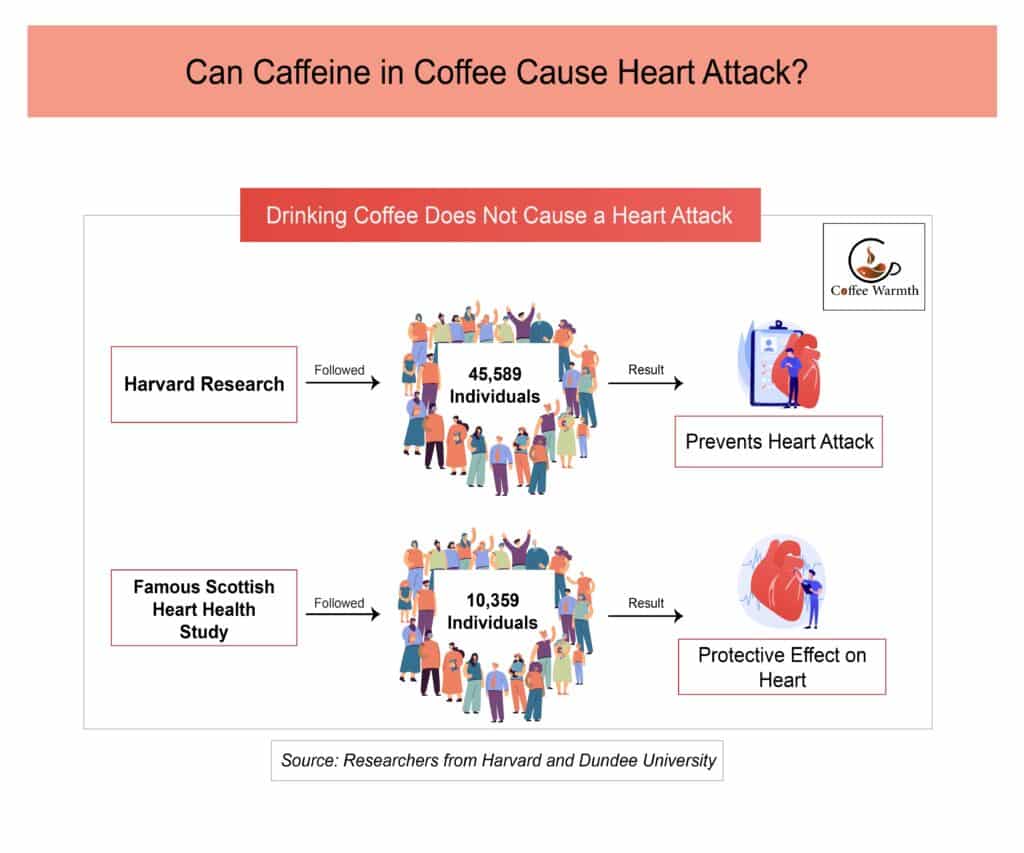
However, the high-risk population should limit their coffee intake to 1 cup to protect themselves from temporary blood pressure spikes which is a risk factor for heart attack, according to the American Heart Association.
Can Caffeine in Coffee Lower Blood Pressure?
Yes, caffeine in coffee can lower blood pressure in regular coffee consumers. Regular coffee consumption can lead to low blood pressure due to improved insulin sensitivity and antioxidant activity of coffee, according to Dr. John Higgins, a sports cardiologist at the UTHealth Science Center. Antioxidants in coffee like flavonoids affect molecular mechanisms which lead to lower blood pressure.
People drinking more than 3 cups a day have lower systolic blood pressure and peripheral blood pressure than non-coffee drinkers, according to a study published by Professor Arrigo Cicero et al from University of Bologna in the Nutrients in 2023.
The figure below shows how caffeine in coffee lowers blood pressure and its amount that leads to reduced blood pressure.
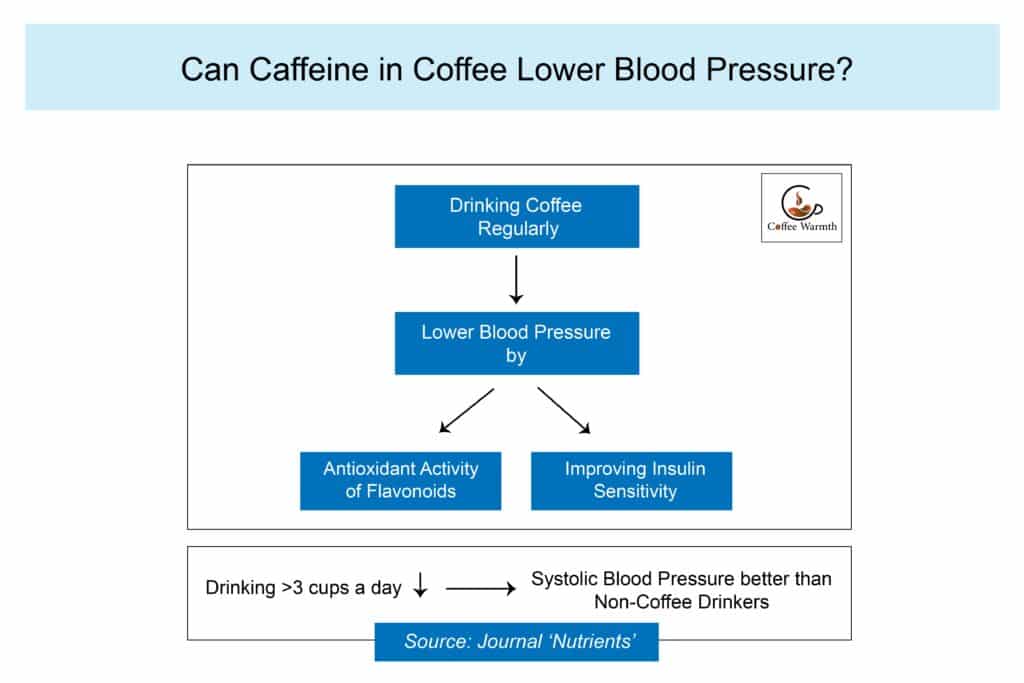
Since blood pressure is a major defining factor for cardiovascular health, keeping it in control can decrease the overall risk of cardiovascular diseases. One of the 15 benefits of drinking coffee is its positive impact on cardiovascular health. The study ‘Long-Term Coffee Consumption and Risk of Cardiovascular Disease’ published in the AHA Journals backs this claim that people who drink 3-5 cups have lower cardiovascular risk than those who drink less coffee.
Does Quitting Coffee Lower Blood Pressure?
Yes, quitting coffee can lower blood pressure because quitting caffeine dilates your blood vessels, decreases vascular resistance, and increases blood flow. These factors reduce blood pressure in both normotensive and hypertensive individuals.
The National Health Sciences has suggested cutting down the caffeinated drinks like coffee to prevent elevated blood pressure.
If your blood pressure elevates by 5-10 mmHg within 30 minutes of coffee consumption, you might be caffeine sensitive. You may need to cut down on caffeine immediately to prevent high blood pressure.
However, some studies suggest that you do not need to quit coffee altogether. Reducing your coffee intake to moderate levels can help decrease high blood pressure, according to a study in ‘Expert Review of Cardiovascular Therapy’.
How Much Coffee Elevates Blood Pressure?
Drinking 2-3 cups (16-24 fl. oz.) of coffee or 200-300 mg caffeine elevates systolic blood pressure by 3-15 mm Hg and diastolic blood pressure by 4-13 mm Hg temporarily, according to Annals of Pharmacotherapy.
The diagram displays the amount of coffee intake that increases blood pressure according to the above study.
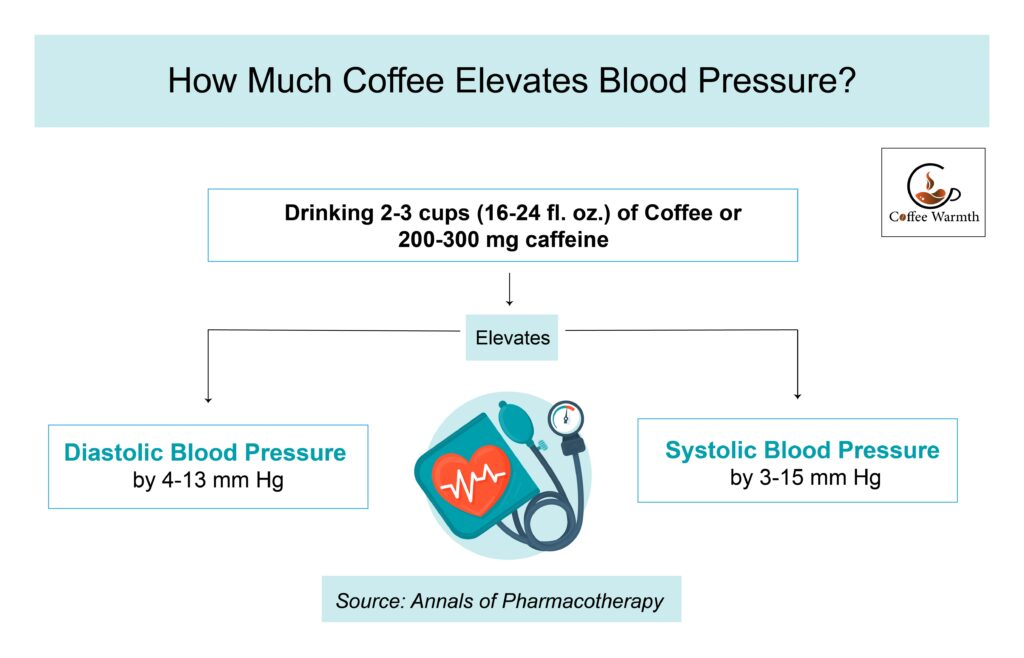
The Federal Drug Administration (FDA) recommends daily caffeine intake of 400mg or 4-5 cups (32-40 fl. oz.) of coffee to prevent any health risks. If you are concerned about your blood pressure, limit your daily caffeine intake to below 200mg.
How Much Blood Pressure Does Coffee Raise?
The answer to ‘how much blood pressure does coffee raise’ depends on individual response to caffeine in coffee. Drinking 2-3 cups (16-24 fl. oz.) of coffee or 200mg caffeine, elevates systolic blood pressure by 10mmHg and diastolic blood pressure by 7mmHg, according to a study published in the American Journal of Medicine.
In the American Journal of Clinical Nutrition, Arthur Eumann Mesas et al revealed in a study that 200mg caffeine intake increases blood pressure by 8.1/5.7mmHg (systolic/diastolic) among hypertensive individuals in 30 minutes and lasts more than 3 hours.
In the Journal of Psychosomatic Medicine, higher caffeine consumption raises 4 mmHg systolic and 3mmHg diastolic pressure.
The graph below shows how much blood pressure does coffee raise according to various scientific studies previously mentioned.
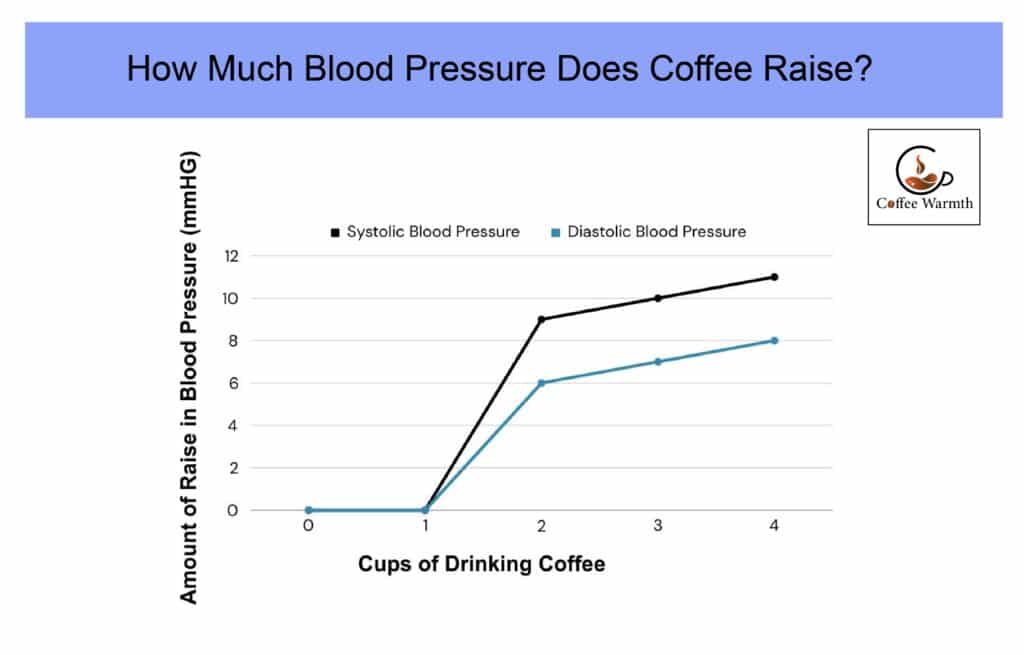
Different studies reveal contrasting results and the level of blood pressure rise is not certain among individuals.
Which coffee drinks are best for high blood pressure?
The coffee drinks which are best for high blood pressure are those with the least amount of caffeine. The following table lists coffee drinks from the lowest to the highest amount of caffeine.
| Coffee Drink | Caffeine(mg) in 8 fl oz | Effect of 3 Cups on High Blood Pressure | |
| 1. | Decaf Coffee | 1.8 | Minimum |
| 2. | Mocha | 2.5 | Minimum |
| 3. | Cafe Au Lait | 47.5 | Minimum |
| 4. | Cappuccino | 62.8 | Moderate |
| 5. | Latte | 62.8 | Moderate |
| 6. | Flat White | 81.6 | Moderate |
| 7. | Cold Brew | 94.8 | Moderate |
| 8. | Black Coffee | 95 | Moderate |
| 9. | Americano | 104.6 | Maximum |
| 10. | Macchiato | 125.5 | Maximum |
| 11. | Cortado | 188.3 | Maximum |
| 12. | Espresso | 502 | Maximum |
Does black coffee affect blood pressure?
Yes, black coffee raises blood pressure temporarily by the action of caffeine. Black coffee contains 95 mg caffeine so drinking at least 2-3 cups (16-24 fl. oz.) of black coffee will affect the blood pressure acutely. However, drinking black coffee regularly doesn’t raise blood pressure and even helps prevent risk of cardiovascular diseases.
Does decaffeinated coffee raise blood pressure?
Yes, decaffeinated coffee may raise blood pressure slightly by action of compounds other than caffeine. According to a study “Effect of Decaffeinated Versus Regular Coffee on Blood Pressure”, decaffeinated coffee raises blood pressure slightly compared to regular coffee which observed big spikes. According to the British Journal of Clinical Pharmacology, decaffeinated coffee induces a smaller increase of diastolic blood pressure.
However, some studies claim that decaf coffee may have no effect on blood pressure. A study published in The American Journal of Cardiology states no change in either systolic or diastolic blood pressure when switching from caffeinated to decaffeinated to coffee.
Can you drink coffee while taking blood pressure medication?
No, you cannot drink coffee while taking blood pressure medication.
Drinking coffee with blood pressure medications like beta blockers decreases their efficacy because caffeine in coffee stimulates adrenaline whereas beta blockers block adrenaline. A study in the English Edition of Revista Española de Cardiología explains that beta blockers block β-adrenergic receptors decreasing blood pressure in hypertensive individuals.
A study in the American Journal of Hypertension concludes that taking blood pressure medication like amlodipine and felodipine 1 hour after drinking coffee greatly increases blood pressure in hypertensive individuals.
You should also avoid drinking coffee with lisinopril and losartan which are other types of blood pressure medications.
